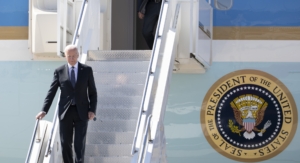Who Is AMLO, Facial Limitations, and Phony PACs for Phony Prosperity
Here’s What You Need To Know
With his landslide victory in Mexico’s presidential election on July 1st, Andres Manuel Lopez Obrador (known as AMLO) earned the broadest mandate in the country’s recent history. His election is either a good or a bad thing, depending on how you interpret the words and actions of the populist, unconventional leader who upended the political establishment.
In the time before AMLO takes office on December 1st, governments and companies with interests in Mexico are trying to determine what happens next on key issues such as the NAFTA negotiations and Mexico’s in-process reforms of its state-run energy industry. Here’s what we know thus far:
- Who Is AMLO? The 64-year-old left-wing leader is painted by detractors as a “Hugo Chavez-style authoritarian” who will ruin the Mexican economy, and by supporters as a moderate and a pragmatist who represents a new alternative to failed establishment politicians. AMLO first became politically active when protesting the oil industry’s practices against indigenous communities in his home state of Tabasco during the 1970s, and earned a grassroots following that ultimately carried him to the Mexico City mayor’s office in 2000, where his popular administration “subsidized subway fares, provided stipends for senior citizens and single mothers and built elevated expressways.” He ran for president unsuccessfully in both 2006 and 2012, launching street protests in 2006 that were expected to end his political career after he blamed his narrow defeat on fraud.
- What Issues Contributed To AMLO’s Election? The driving issues in Mexico’s presidential campaign were the hot-button issues of crime, corruption, and the status quo. AMLO pledged to be the only candidate who could end the “mafia of power” and corruption that plague Mexico’s current government, as well as try new (albeit vaguely defined) approaches to bring an end to high levels of violence in the country perpetrated by drug cartels that have claimed more than 230,000 lives since 2007. Coupled with an “anemic” Mexican economy that has grown at 2 percent per year for the past quarter century and a backlash towards the dominant establishment parties that have failed to deliver on these issues, AMLO was able to present himself – and the Morena party that he founded in 2014 – as the only option for solving Mexico’s challenges, despite the party being engulfed in a growing scandal over whether it used a charitable fund for earthquake victims to buy votes.
- What Does AMLO Mean For NAFTA Negotiations? Since AMLO’s election, Mexican consumer confidence has surged to its highest level in a decade and billionaire tycoon Carlos Slim has said he sees “no risks” to his business empire in the country, however the private sector as a whole is more reticent as it waits to see how the incoming administration will handle outstanding issues, including NAFTA negotiations and energy. On the former, AMLO has suggested his preference for NAFTA to remain in-force with some modifications possibly, although a top advisor has said AMLO would prefer no NAFTA to a bad agreement, perhaps setting the table for heavier subsidies for Mexican agriculture and an “aggressive state-centered industrial policy.”
- What Does AMLO Mean For Energy? On energy, AMLO has used an “investor-friendly tone,” causing business to hope that he will tweak, rather than reverse, the country’s reform plan launched in 2013 that began to end state energy giant Pemex’s 75-year monopoly over Mexico’s resource-rich energy sector. While the Mexican government has held 14 auctions and signed 100 contracts since then, AMLO supports the halting of further auctions for his government to review these contracts for evidence of corruption, and review privatization more broadly. With these actions amidst U.S.-based and other foreign energy companies eyeing opportunities in Mexico, speculation on what AMLO’s appointed energy advisors mean for policy is rife, proving the standard D.C.-maxim that “people are policy.”
The uncertainty facing American and other foreign companies with interests in Mexico will only be removed by the concrete actions of his administration when it takes office this December. To be prepared for whatever outcomes AMLO’s tenure leads to, companies need to take steps now to minimize the impact these political risks may have on their interests.
Subscribe to Receive Insights
"*" indicates required fields
News You Can Use
FACIAL LIMITATIONS
Whether unlocking an iPhone or securing the 2020 Tokyo Olympics, facial recognition technology is drastically improving and becoming a more common part of everyday life, bringing with it new challenges for policymakers. A recent example of these challenges for policymakers – literally so, for some – was when one popular facial recognition tool falsely matched 28 members of Congress with mugshots from people who have been arrested for crimes. Other technology used by the Federal Bureau of Investigation was found to misidentify people 14 percent of the time.
While that may be a promisingly small error rate for new technology, it will not suffice when people’s lives and freedom are at stake based on the results. Few laws currently govern facial recognition technology and, with concerns due to mass surveillance and a lack of scrutiny, even prominent tech industry executives are calling for a regulatory and ethical framework. If technology leaders do not provide one soon, policymakers are likely to address the limitations on their own terms, regardless of the implications for innovation in the space.
BUYER AND BUSINESS BEWARE
While it used to be impolite to talk about politics at the dinner table, today fewer people are leaving politics at the door, with political dialogue at times lacking both civility and decency. Enter companies, who are caught between some consumers who expect them to take a stance on political issues, and data that shows other consumers who do not like when companies take stands on “issues pegged to Trump.”
It remains to be seen if proposals such as Sen. Orrin Hatch’s Geneva Convention-like “rhetorical disarmament” in the culture war or AEI President Arthur Brooks’ full “political cleanse” can help maintain friendships and foster more conciliatory discussions among the general public, but one thing is certain: companies need to think twice before mixing business with politics, and proactively prepare for when today’s fast-moving environment fraught with new risks targets them and leads to public affairs challenges.
PHONY PACS FOR PHONY PROSPERITY
With the midterms rapidly approaching, political action committees (PACs) are in full swing to support their favored candidates. On the Left, most of these groups happen to be funded by “one obscure nonprofit” in D.C. called the Sixteen Thirty Fund, “which has funneled millions of dollars to progressive causes in recent years” and has set up a number of local groups across the countries with names such as “Floridians for a Fair Shake, Michigan Families for Economic Prosperity and North Carolinians for a Fair Economy.”
This naming practice is a classic ploy to make the groups appear to be like something they are not, demonstrating the need to always dig deeper and expose the truth when it comes to what opposing interests really stand for and who is behind them.
BEYOND THE BELTWAY SPYGAMES
Spies have become a staple in today’s headlines, with Washington-intrigue and Vladimir Putin’s Russia taking the lion’s share of the attention. Yet, a recent Politico investigation into the foreign espionage operations targeting Silicon Valley and California “community leaders and local politicians who may later become mayors, governors or congressmen” raises two important points lost in today’s headlines.
First, that foreign espionage is targeting corporate interests in cities outside of Washington (and outside of Silicon Valley as the tech industry diffuses to midsize cities such as Austin, Chapel Hill, North Carolina, and Boulder, Colorado); secondly, that other foreign governments, notably the Chinese, are becoming “increasingly sophisticated” in their tactics in doing so. While policymakers undoubtedly will need to devise a broad strategy to confront these challenges, companies in the interim may well want to practice good operational security and wholly understand the landscape in which they operate as a first step to mitigating any potential risks they face.



